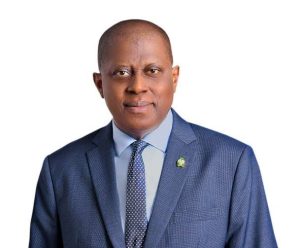 Those who know Mr. Olayemi Cardoso will agree he got his current job as the Governor of Central Bank of Nigeria on a platter of solid professional background and strong personal attributes. His pedigree is rich as his character is unsullied. Cardoso had a remarkable private sector career where he shone brilliantly in banking, stockbroking, and consulting.
Those who know Mr. Olayemi Cardoso will agree he got his current job as the Governor of Central Bank of Nigeria on a platter of solid professional background and strong personal attributes. His pedigree is rich as his character is unsullied. Cardoso had a remarkable private sector career where he shone brilliantly in banking, stockbroking, and consulting.
Cardoso also came from a very solid family pedigree. Nigeria’s late Prime Minister, Sir Abubakar Tafawa Balewa, appointed his late father, Mr. Felix Bankole Cardoso, as the first Accountant-General of the Federation in 1963. The late elder Cardoso served with an enviable record until 1971.
Part of the remarkable private sector career of Olayemi Cardoso was his appointment as the Chairman of the Board of Citi Bank in Nigeria.
Cardoso began his public service journey when he became the Commissioner for Budget and Economic Planning in the cabinet of Asiwaju Bola Tinubu, Governor of Lagos State as he then was in 1999. In addition to superintending that ministry, Cardoso was charged with several other responsibilities, including heading important cabinet committees that birthed landmark agencies in the state. Cardoso was known for enforcing strict budgetary discipline that contributed significantly to the overall success of the Tinubu administration in Lagos. He refused to authorise the release of funds for projects or programmes that had no budgetary head. For all of that and many more, Cardoso was nicknamed the Headmaster.
Armed with a Bachelor of Science degree in Managerial and Administrative Studies and Masters in Public Administration from the prestigious Harvard Kennedy School of Government and parading strong personal attributes, Cardoso is obviously a perfect fit for the CBN top job. He is calm but firm, strict but fair, prudent but practical, straightforward, and honest with loads of integrity. These are the unique qualities he carried unto his job at the apex bank and his major selling points when, on September 23, 2023, he officially assumed office with the Senate confirmation of his appointment.
However, it does appear Cardoso will need much more than that to succeed in his present assignment. Under him, the CBN seems to be doing the right thing or doing things right: thinking and working on coming up with appropriate monetary policies, moving to rein in the rising foreign exchange rates and particularly achieve an appropriate value for the naira, which Cardoso believes has been undervalued.
But in the wake of the floating of the Naira, some of the variables shaping the value of the national currency, including limited production in the country as a result of insecurity, Nigerians’ high taste for imported products, dwindling exports, poor dollar remittances, humongous school fees of Nigerian students abroad and medical tourism all of which engendered a strong demand for dollar, far outweighing supply, seem to be clearly beyond his control.
Until these situations change for the better, no amount of monetary policies by the CBN will work any miracle, hence Cardoso’s predicament. For instance, in his presentation at the sectoral debate organised by the House of Representatives two weeks ago, the CBN governor lamented that the growing number of Nigerian students studying abroad, increasing medical tourism and food imports have led to the depreciation of the Naira against the Dollar. According to him, over the past decade, foreign exchange demand for education and healthcare totalled nearly $40 billion, surpassing the total current foreign exchange reserves of the CBN, while personal travel allowances accounted for a total of $58.7 billion during the same period.
Another critical yet intriguing factor but seemingly odd in Cardoso’s reckoning is the perception in some quarters of some of the decisions of the CBN, which the apex bank considers purely administrative, but which some others give strange connotations.
